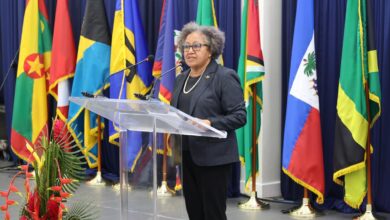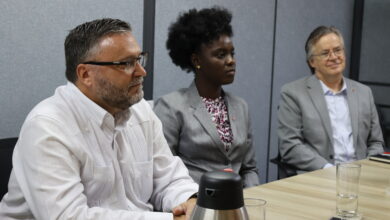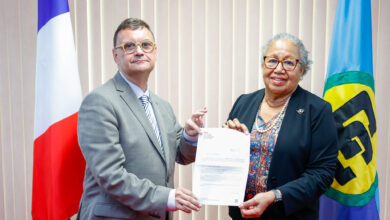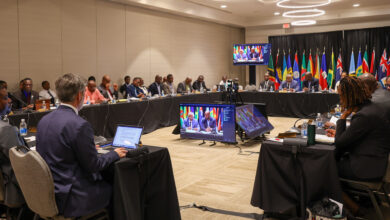(CARICOM, Secretariat, Turkeyen, Greater, Georgetown, Guyana) I am very pleased to extend to you all a very warm Nature Island welcome. As you have already observed Dominica, the Nature Island of the Caribbean is still covered with up to 60% forest nourished by almost 200 inches of average annual rainfall, manifested by 365 rivers.
I welcome you here to a friendly and natural environment to celebrate with us the 10th Caribbean Week of Agriculture under the theme “Caribbean Food and Nutrition Security in a Changing Climate: The Nature Island Experience”.
This Climate Change Adaptation workshop which is the first major event for Caribbean Week of Agriculture (CWA) is occurring during the annual hurricane season which these days is highly influenced by the effects of Climate Change. Just last week on September 28, 2011 Dominica experienced its worst flood in its history.
Approximately ten (10) communities which accounts for almost 25% of the population were affected. Seven hundred (700) households suffered loss with fifteen (15) families losing their houses completely. Just last year the entire region suffered its worst drought in more than fifty years. Every year we are threatened by the possibility of hurricanes destroying our economies, displacing populations and placing pressure on an already difficult fiscal situation. Whatever your opinion on this Climate Change phenomenon that does not change the fact that we are experiencing more, larger and intense hurricanes with increasing weather variability and unpredictability.
Therefore, the issue of adaptation becomes very critical. It is crucial because we are a small island developing state with a narrow and fragile economy. According to the International Monetary Fund (IMF), each Caribbean country loses approximately 2% of their GDP from the effects of hurricanes on an annual basis. The IMF indicated that in 2007 Hurricane Dean caused infrastructural loss of 20%. It means therefore, Dominica must adapt to reduce its vulnerability and mitigate its losses. This is particularly true for the agricultural sector which provides 20% of GDP and employs 35% of the population.
The rural economy is intricately connected to the agricultural sector, hence rural life and livelihood are its major dependants. It is in light of this that government has undertaken major investments in the agricultural sector to strengthen the sector, reduce vulnerability and enhance competitiveness.
Over the past ten (10) years government has invested in excess of 15 million dollars in irrigation projects to respond to climate variability and improve production output. Assistance to farmers for feeder road rehabilitation is in excess of 5 million dollars.
We have spent 8.2 million dollars building and rehabilitating Inland Reception and Distribution Centres in three (3) strategic locations in Dominica. Approximately 3.5 million dollars was also spent building and renovating two (2) packinghouses in Roseau and Portsmouth.
We have built the National Centre for Testing Excellence (NCTC) at a cost of 3.6 million to provide upgraded lab services to producers, exporters and manufactures. Three farmer services centres were either built or renovated at a cost of 2.2 million dollars. We have invested in banana and citrus rehabilitation and more over the entire agricultural sector in the post disaster period.
This investment costs close to 20 million dollars. We continue to subsidize fertilizer by up to 40% and provide free fertilizer to farmers. This list is not exhaustive. We have invested to make our agriculture stronger, better and more competitive.
Ladies and gentlemen, invited guests, my friends this is our vision for the agricultural sector for this country. We are aiming to achieve a sector that is:
1. Fully diversified to satisfy in excess of 90% of domestic demand and the export market. The investments we have made and outlined above will improve our competitiveness on the regional market.
2. Build resilience to Climate Change focusing on crops adaptable to droughts, hurricanes and other such weather phenomenon. These crops will be driven by market demand.
3. Building a production, transportation and marketing system for a core of crops patterned largely on the banana model. The banana model emerges under a regime of protected market access and therefore, the dynamics and realities of this globalized world are very different and so we must take this reality into consideration.
4. Invest and adopt science and technology utilizing and expanding current capacity in green house and irrigation systems. We will also work with friendly governments, our supporting organizations such as IICA, CARDI, and FAO among others and to benefit from technology transfer to improve crop variety, quality and output.
5. Develop and improve production systems for vegetables, herbs and spices to better cater for the domestic market. We will create greater linkages between the local private sector and producers to meet domestic demand.
6. Help strengthen and expand the agro-processing sector through the provision of lab services, technical support and adequate and appropriate agricultural raw material.
7. To organize the livestock sector focusing on Pork, Poultry and Small Ruminants. The current Central Livestock farm is being improved, upgraded and converted into a sustainable livelihood adaptation centre. We will build a modern abattoir for pork and poultry and provide support to producers to improve and expand their farms.
8. We will continue to build the capacity of fisher folk through training, transfer of appropriate technologies and providing and facilitating access to modern fishing boats and other equipment.
9. We will seek to create a ministry and division that is more proactive, responsive and futuristic in the management of the sector. We will pay particular attention to structures, staffing and procedures to improve delivery systems, outcomes and overall efficiency.
10. We will build an agricultural sector that is climate friendly and smart. Government will continue to work with the Dominica Organic Agricultural Movement (DOAM) to expand Organic Agriculture to take advantage of market opportunities. Farmers will be trained to utilize environmentally friendly practices that support biodiversity and contributes to food safety, human health and well-being.
The investments that we have made and the vision that we have outlined will help shape and redefine our agricultural sector, economy and country in the 21st century.
Ladies and gentlemen, friends, this is what has brought us here together to celebrate the 10th Caribbean Week of Agriculture (CWA). It is with much pleasure that I welcome you to the Nature Island of the Caribbean to enjoy the Nature Island experience. Do have a wonderful week of activities in Dominica.





